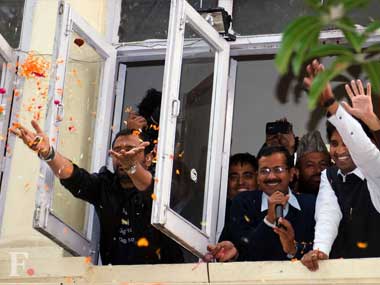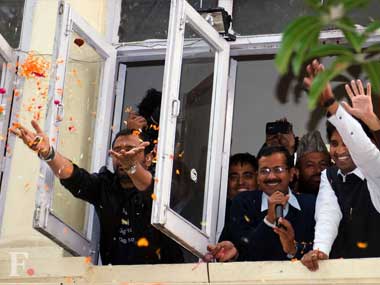Arvind Kejriwal capturing the popular imagination has been the big story of Delhi assembly polls. Beyond doubt it was his personal charisma and the belief that the electorate had in him that made his unsung, unknown candidates vanquish the high and mighty of Delhi politics. And his own defeat of the high presiding deity of the capital, Sheila Dikshit, by a humiliating margin of 26000 votes from a constituency, which is incidentally called, New Delhi, was a story in itself. But the true significance of the Aam Admi Party is much more than that. The most interesting development, is possibly the return of what they used to call the old Lucknowi Pehle Aap courtesy. Politics and politicians until yesterday were all about grabbing power by hook or by crook, but since last evening, when electoral trends began to crystalise, the world of Delhi’s politics has seen the sudden rise of a new competing political culture of humility, self righteousness and uprightness. [caption id=“attachment_1277515” align=“alignleft” width=“380”]  Kejriwal has already changed Delhi’s political landscape: Naresh Sharma/Firstpost[/caption] The BJP that stood in number one position, just four seats short from the majority mark takes a high moralistic position and says with “all humility” that since it doesn’t have a “natural mandate”, it would prefer to sit in opposition benches than seek support from others or indulge in politics of allurement or horse trading. It then turned to AAP, a close second, urging them to form the government. The BJP is reinventing itself, or at least trying to be portray that it is getting back to its erstwhile long forgotten moralistic politics of the early Jansangh days. That they have departed from from what it did and loved doing in the past in Jharkhand, Goa, Himachal Pradesh, Uttar Pradesh or even in Karnataka. It’s a season of change and the BJP has to be politically correct to be on the right side of public mood, more so, when parliamentary elections are to follow shortly and it is riding high on expectations. AAP, which was born out of Anna’s anti-corruption transparency movement stand before standing its own ground, has taken what is again, a smart political move – “we will neither support anyone nor take support from anyone. The BJP has emerged as number one party it is their responsibility to form the government.” By taking this politically correct decision it also ensuring a clean break from the politics of the past. Its first big change then, is to change the very distasteful tradition of trade off politics. A thoroughly vanquished Congress, which has been reduced to a single digit party, is not finished yet and now wants to act as a propellant for AAP, by supporting it to form the government. If that were to happen, the numbers– AAP’s 28 plus Congress’s 8 – show that AAP will have the strength to withstand any floor test. It’s a classy situation where the supposed beneficiary is rejecting an offer that would make them rule Delhi for next five years. The new AAP politics is spurning the clichéd secular-communal alignment and rhetoric, for it is trying to carve out a niche for itself, both inside and outside Delhi. So much for the Congress’s secular proposition and its open hearted offer of support. These elections have seen the end of the rise of the sons and daughters of the established political families and leaders in the Capital, with the single exception of Parvesh Verma of BJP, son of former Delhi chief minister Shahib Singh Verma. But then Parvesh, even his rivals admit, does not strictly represent continuity. His father, a formidable Jat leader, died in a tragic car accident in 2007 but Parvesh had to toil at party offices and among the people for a long time as an ordinary party worker. He was denied a ticket in the last elections, state or parliamentary and was considered this time on “merit”. Restive youth voters clearly don’t want a dynastic system to continue. The established old guards, three-time, four-time MLAs bore the maximum brunt of anti-incumbency. The young guys and girls did not simply interact on social media generating awareness, but they also came out to vote, proving the cynics wrong. Never before has there been a fight to sit in the opposition benches. There are of course some real politik reasons involved but even that is a healthy sign. As the counting went into the final rounds, the senior BJP leaders made a quick assessment that with 32 seats of their own, getting the four needed to form the government would not be easy. Out of the two ‘others’ who had won, one was an Independent BJP rebel, while the other was Shoeb Iqbal, a legislator from the minority dominated Matia Mahal constituency who has been winning on different symbols for a long time. But given that he ran on a JD(U) ticket this time, he was ruled out for obvious reasons. Of the eight Congress MLAs who won, four are Muslim, and two are Sikh. It was thus futile to seek a tacit understanding with individual MLAs from Congress ranks, or even break their ranks. Harsh Vardhan, who has been projected as the BJP’s Chief Ministerial candidate, and who won with a high margin of over 43000 votes, had a chat with Narendra Modi, Nitin Gadkari and Rajnath Singh, and it was decided that he should take a morally dignified position and declare his unwillingness to stake claim to form a government. So now the ball is in Lieutenant Governor Najeeb Jung’s court. He has to take a call. He may go by the precedent set by President Shankar Dayal Sharma to invite the single largest party to form the government and should they refuse, then approach the second largest party. As both BJP and AAP are expected to refuse the Lt Governor’s offer, President rule is likely to follow. Delhi has never seen a situation like this before, both pre and post elections. A day after the results, Delhiites at large are a bit disappointed that after venting all their anger to vanquish Congress party, they still don’t have an alternate government in Delhi. While Delhi made many new beginnings on Sunday, it also set the clock back by about a decade, to the days when states used to give a fractured mandate that would make the formation of a popular government impossible. Or even if the government was formed, it could not govern because the energy of political bosses would be channelled in merely managing the numbers.
Politics and politicians until yesterday were all about grabbing power by hook or by crook, but since last evening, when electoral trends began to crystalise, the world of Delhi’s politics has seen the sudden rise of a new competing political culture of humility, self righteousness and uprightness.
Advertisement
End of Article


)
)
)
)
)
)
)
)
)



